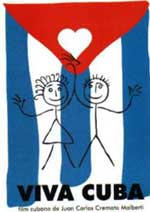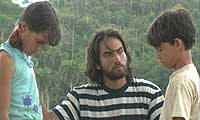
Juventud Rebelde
July 24, 2005
Positive, exclamatory and very convincing
By: Joel del Río

Juventud Rebelde
July 24, 2005
Positive, exclamatory and very convincing
By: Joel
del Río
A CubaNews translation by Ana
Portela.
Edited by Walter Lippmann
http://www.jrebelde.cu/2005/julio-septiembre/jul-24/afirmativa.html
Film and
movie halls in the country are showing Viva Cuba, a film that is already
becoming a great success this summer and is becoming, in July 2005. a milestone in recent Cuban film
history.
 One of the most
controversial endings in Cuban films was Nada (2001), the first film by Juan
Carlos Cremata taking us by surprise as always and who now gives us Viva Cuba.
This is the first Cuban film played by children and includes, also, the most
eloquent and suggestive ending this critic has seen in a long time. The
ending is a beautiful and tragic metaphor with the pair of young protagonists,
defenseless, confused about the impossibility of a new flight, precisely at the
point where the island ends and there is no more space to escape to from
intolerance and lack of harmony. They are at the point where the lighthouse
warns that the crocodile sinks its nozzle into the reverberating waters of the
Caribbean.
One of the most
controversial endings in Cuban films was Nada (2001), the first film by Juan
Carlos Cremata taking us by surprise as always and who now gives us Viva Cuba.
This is the first Cuban film played by children and includes, also, the most
eloquent and suggestive ending this critic has seen in a long time. The
ending is a beautiful and tragic metaphor with the pair of young protagonists,
defenseless, confused about the impossibility of a new flight, precisely at the
point where the island ends and there is no more space to escape to from
intolerance and lack of harmony. They are at the point where the lighthouse
warns that the crocodile sinks its nozzle into the reverberating waters of the
Caribbean.
But before reaching this allegorical ending, the spectator will have seen a very native and tragic-comic road show, a rhapsody woven with threads of gentle naturalism, a story vividly narrated – successfully achieved in the editing by Angélica Salvador – with few dead points and the roles sharply defined – a Montesqiue-Capulet classicism. Yes, because there is something of this story in the Cuban script taking us back to the Venetian environment of those two families Shakespeare confronted until the youngest of each family break the constant chain of hatred with a strange link of flaming love. Cremata and his co-script writer (Manuel Rodríguez) perhaps were not influenced by Shakespeare and preferred to deliver a beautiful fable of Jorgito and Malú chock-full of humor, beautiful landscapes and sharp criticism in the subtexts. They also preferred a stretched tone, graceful, agile, not somber or pessimistic.
 The
reader should not get the impression that Viva Cuba is a thoughtless
effervescence or that the sublime simplicity becomes, silly, clichéd, or with a
pre-determined optimism. This is not what I wanted to say. I must explain, because it
is difficult to describe a work that sidesteps with great skill all forms of
vulgarity. It is hard to avoid rhetoric in the style of “a song of love and
hope” or “a tender poem about friendship at an early age” (which it also is). The
writer has to tell these to sustain a tone which moves, without violence, between
the picaresque and the lyrical, that is also the case with the images and
soundtrack of the film. Cremata and his team have given us moments of acute
farce, lyrical scenes, and fantasies, children who move the stars or who grow
dry stalks by only wishing it.
The
reader should not get the impression that Viva Cuba is a thoughtless
effervescence or that the sublime simplicity becomes, silly, clichéd, or with a
pre-determined optimism. This is not what I wanted to say. I must explain, because it
is difficult to describe a work that sidesteps with great skill all forms of
vulgarity. It is hard to avoid rhetoric in the style of “a song of love and
hope” or “a tender poem about friendship at an early age” (which it also is). The
writer has to tell these to sustain a tone which moves, without violence, between
the picaresque and the lyrical, that is also the case with the images and
soundtrack of the film. Cremata and his team have given us moments of acute
farce, lyrical scenes, and fantasies, children who move the stars or who grow
dry stalks by only wishing it.
For
a better understanding of the intentions, twists, suggestiveness of the film, it
is worthwhile referring to recent declarations made by Cremata to El Caimán
Barbudo: “Cuban idiosyncrasies are part of my life project. And Cuba is a
very different country. What I am interested in is transmitting the
singularities of this unique country. I am a staunch defender of differences, of
tolerance. I believe that a revolutionary is the one who re-evolves, who gets up
every morning to change what has been achieved. Because I believe that
re-evolution is not an inertia that generates satisfaction for having achieved
something, but a joy felt with the re-creation, the re-making, re-invention,
re-discovery of a different way, much better, new, once again. I believe in the
will and vocation of re-doing the world I live in. That is why I seek to
confront new situations, alive, unheard of, and unique. In Viva Cuba we use a
lot of patriotic symbols: the flag, the Pioneers, the hymns, Che, the mambo,
danzon, the bumblebee, the guajiro, the centipede. I lived outside of Cuba for eight
years, in different countries. and all that time I felt the strong need to
express myself as a Cuban. This experience served to make me aware that what I
wanted was to make films here. And this marked me. Perhaps that is why my films,
up to now, are about being here or there, of leaving or staying, or returning or
departing”.
Honestly, I had never seen in Cuban films, children who talked with such grace
and freshness; I almost never saw the Island photographed with such affection
and colorful dynamism (thanks to Alejandro Pérez). Also with the imaginative
framing and angles and very rarely saw a national production where religious
solemnity is pictured, without hang-ups, smiles or heavy jokes. The film deals
with that intangible essence that is called spirit perhaps with more lightness
or smiles than what tends to be accepted by the apprehensive.
Viva
Cuba is an exclamation of joy and anxiety, a sensitive confirmation that wishes
can be made to falling stars and are granted although we know, for sure, that
the balls of fire going through the firmament are indifferent to our desires. Or
is a true gesture of good will enough to bring us closer and even move the
distant and stranger spaces? The film by Cremata allows us these and many more
questions. Can it be that we are missing something great, essential? Otherwise
there is no explanation why our little ones decide to escape from our reach.
Viva
Cuba is a novel and surprising gift, a film whose impact is a poignant shudder
at an emotional level and intuition. I can imagine shortsighted, narrators and
academicians mentioning excesses to the incredulity the story calls for, of the
elemental and dependability of certain situations and personages, or the poor
structure at the core of the wish to join subject with object in the plot, of
how the photography is too pastoral and panoramic when they move through Cuba.
Perhaps they are right in many of these points but it would be aberrant to
“read” the actions of these tropical Hansel and Gretel without considering how
warm and true ALL the interpretations are (although the prize goes to Malú
Tarrau and Jorgito Miló closely followed by Larisa Vega y Luisa María Jiménez),
of how moving in its strict simplicity about these children who no one listens
to or asks their opinion. This powerful and entertaining film shouts to us
about intolerance and despotism, of the need for love and understanding while
whispering quietly ideas about death, relief, the loss of innocence and the
manifest need to listen more and shout less.